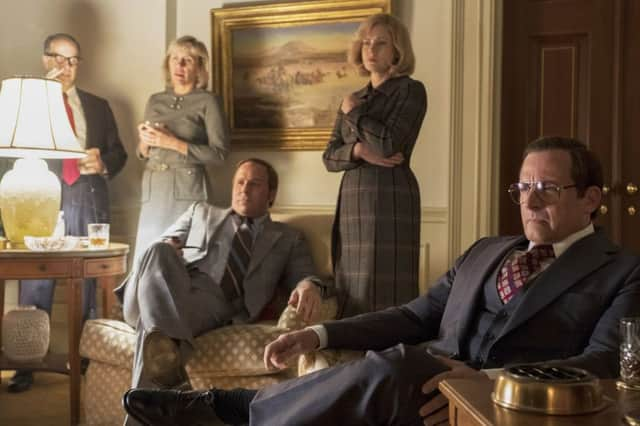Film reviews: Vice | The Mule | Destroyer


Vice (15) ***
The Mule (15) **
Destroyer (15) ****
Lest the current occupant of the White House make you feel less critical of George W Bush’s motley crew of warmongering fact-fudgers, Adam McKay’s new film Vice is here to put the kibosh on such misplaced nostalgia. Following very much in the style of his financial crisis satire The Big Short, it’s a Michael Moore-esque polemic that dramatises the ruthless way Dick Cheney rose through the political ranks, using the perceived powerlessness of the vice president’s office to effectively seize control of the White House and bend the world to his own plutocratic will.
For anyone who read the odd newspaper or regularly watched The Daily Show during the Bush era, nothing in the film will come as all that much of a surprise. Nevertheless, there’s some merit to McKay’s deep-dive into Cheney’s life, particularly the way Christian Bale manages to simultaneously evoke Jon Stewart’s parody of Cheney as a Penguin-esque Batman super-villain (a nice touch given Bale’s own turn as the Dark Knight) while also playing this most secretive, intractable and inarticulate of men with a flash of humanity that somehow makes him even more disturbing and monstrous.
Advertisement
Hide AdAdvertisement
Hide AdThe film starts with the attack on the World Trade Centre, allowing McKay to signpost Cheney’s brazenly opportunistic power grab in Washington while the president was away reading children’s stories with a bunch of school kids. It then rewinds to show him as a young alcoholic “shit bag” in 1960s America, a man who agrees to straighten himself out when his smart, ambitious, nerves-of-steel wife, Lynne (Amy Adams), threatens to leave him. Securing himself a congressional internship with that most Orwellian of Bush’s future henchmen, Donald Rumsfeld (Steve Carell), Cheney gets his government schooling in Nixon’s White House, a place where idealism and civic duty is mocked and where he also comes to understand that true power is exercised behind closed doors by people who are accountable to no-one.
What follows is a fast-moving jumble of grim farce, satirical stunts, fourth-wall-breaking absurdity (including an audacious choice of narrator that becomes the film’s darkest joke), countless mixed metaphors and plenty of indignation as McKay builds to his grand theory that Cheney’s puppet-master-like pursuit of an imperial presidency had terrible consequences for everyone, even his own openly gay daughter (played by Alison Pill). At its centre Bale sells us brilliantly on Cheney’s mercenary singlemindedness, draining him of any charisma as his body morphs into a heart-attack-in-waiting blob with a comb-over. Adams, meanwhile, slyly transforms Lynne into his no-nonsense co-conspirator (together they hint at what Macbeth might play like were its power-hungry protagonists freed from the burden of having a conscience).
Unfortunately there’s also something supercilious and self-congratulatory about way McKay constructs the film around them. His outrage is palpable but reductive – and it’s a little rich for the film to repeatedly admonish the public for being too distracted by meaningless pop culture sensations like Britney Spears or the Fast and Furious movies when McKay’s own creative partner (and this film’s producer) Will Ferrell was one of the biggest box-office draws of this period. Might those Ferrell-fronted “frat pack” comedies (many of which McKay had a hand in too) have provided similar levels of distraction from what was going on? Like the protagonists of The Big Short, McKay profited hugely from cannily exploiting the lunacy of the Bush era. To try to pretend otherwise makes Vice’s critique feel disingenuous.
Clint Eastwood’s latest directorial effort, The Mule, also feels disingenuous. Loosely based on the story of a 90-year-old Second World War veteran corralled into becoming a drug runner for a Mexican cartel, the film provides Eastwood with his first acting role since 2012’s creaky baseball drama Trouble with the Curve, though like his ageing bigot in 2009’s Gran Torino, he seems to be relishing the opportunity to play another old coot with no filter when it comes to dropping wince-inducing racial epithets. Unlike that film, this one isn’t quite as interested in reckoning with Eastwood’s complex back-catalogue and legacy, preferring instead to take a promisingly dark and strange story and turn it into a cosy redemption saga about a selfish man intent on using the profits of his new career to make amends with the family he failed. Eastwood’s typically minimalist direction keeps everything moving, but he seems thoroughly uninterested in the wider moral implications of his protagonist’s actions.
Far more compelling is Nicole Kidman’s intense, bruising performance as a burned-out detective trying to atone for past mistakes in Destroyer, an ingeniously structured Bad Lieutenant-esque procedural directed with real punch by indie veteran Karyn Kusama (Girl Fight). Set in Los Angeles, the film opens with the discovery of a dead body, but it’s Kidman’s body that commands the screen as she commits to the consequences of her soul-sick character’s hard-living life. Face ravaged by years of regret-dulling alcoholism, Kidman’s physical transformation – reinforced by flashbacks to her character Erin’s first undercover assignment – is plausibly rooted in someone whose tragic flaws have accumulated into a life full of pain. The film comes on like a slow-burn character study of a morally compromised anti-hero, but while it does that stuff well, it also transforms into a pretty hard-rocking bank-robbery movie, with Kidman – machine-gun in hand – proving a formidable bad-ass. ■